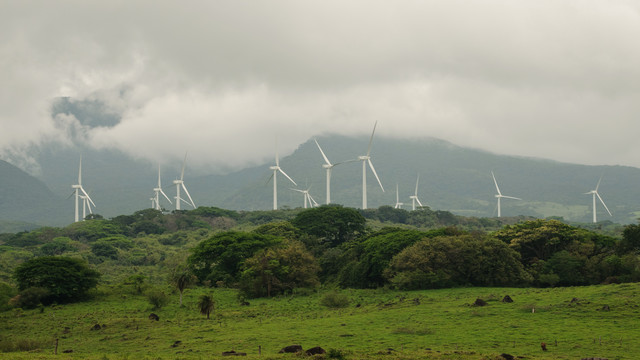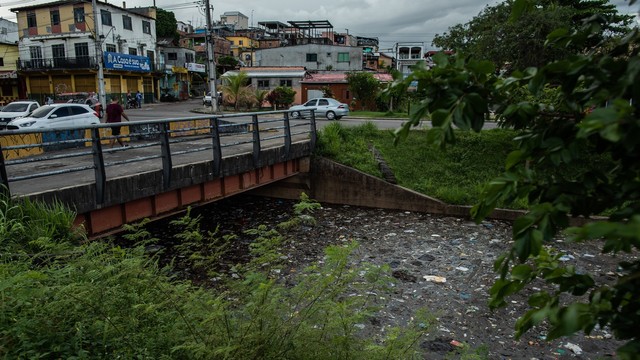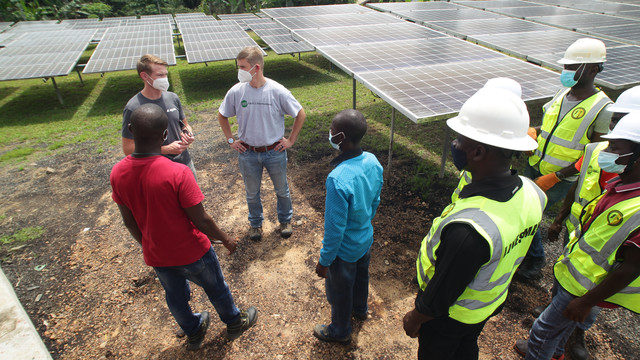Ebola – what must we learn?
The Disasters Emergency Committee (DEC) is launching an unprecedented appeal in response to the Ebola crisis, but what lessons must we learn if we are to effectively and equitably tackle future shocks of this scale?


Care workers in Guinea put on protective clothing (Photo: EC/ECHO)
We live in one world but people face wildly different outcomes depending on their means, and the capacity of their country and government to meet both regular and unexpected demands.
The Ebola crisis demonstrates yet again the acute difference in capacity globally between rich and poor, in terms of access to basic care.
And regardless of pledges made at a global and regional level, the real difference will be what happens at ground level.
Money per se is less important than practical delivery, which is based on a combination of infrastructure and people: that is where the true battleground has been since Ebola tightened its grip on West Africa.
For the first time in 50 years, the DEC is launching an appeal in response to a disease outbreak. Like IIED, the committee sees how the spread of the disease is seriously damaging people's abilities to support themselves on a national and regional scale, threatening a humanitarian disaster.
Big unexpected events such as Ebola can knock nations off course. In this case, after years of war and civil conflict, the economies of Liberia, Sierra Leone and Guinea were picking up, with investment rising and growth at 10 per cent or more. Recent estimates show significant economic losses, to food production and exports, as well as investment put on hold. The financial losses are even impacting the African continent as a whole.
It makes you ask what therefore might a big climate shock do?
Building resilience to shock needs to happen at both a national and community level. Communities must act quickly and share information fast for crises such as these. This means good capacity at the local level in terms of governance, connection and communication.
IIED's work with slum dweller federations shows the vulnerability of marginal groups at times of crisis, not only to the event itself, but also to subsequent policy measures. In the aftermath of the 2004 tsunami, many shack-dwellers found their homes had been swept away and they were not able to re-establish their claims over former house plots.
Equally, slums are being razed in Guinea and Ghana in the name of reducing risks from Ebola, with the poorest bearing the brunt.
There is considerable uncertainty about the actual statistics on levels of infection, distribution of cases and number of deaths. A combination of limited information plus incentives to hide the truth mean that the actual severity and incidence are likely seriously under-reported.
This matters because as has been seen in the cases of Nigeria and Senegal, in the case of new infections, urgent rapid action is key to closing off further spread.
In this light, it is encouraging to see the mobile phone being put to good use in Sierra Leone, where IBM is championing this ubiquitous piece of technology with the potential to save thousands of lives.
To support the mapping technology IBM is making available in the Ebola-stricken country, radio broadcasts are being used to encourage people to use the system and Telco operator Airtel has set up a free number via which citizens are able to send SMS messages. This allows citizens to report Ebola-related issues and government, health agencies and others to keep track of the disease.
However, in all the big discussions about how the world responds to this outbreak, we must not forget that there's an intensely human story associated with Ebola, linked to the care and human contact so needed by the sick.
Fear of this infection means fundamental decencies of human society and care for each other are being put aside; the sharing of food, laying out of the dead, comfort from the squeeze of a hand. Images of people clad in space suits picking up tiny children's corpses for burial, ever so necessary, also shock by the incongruity.
Ebola is hitting women harder than men, since women tend to be care-givers, nurses, hospital cleaners – involved in laying people out for burial, and as midwives.
Figures from Liberia suggest 75 per cent of deaths are female, and Sierra Leone and Guinea also show a skew towards women being more affected. Interventions need to harness women's networks and systems of communication.
People say that aid due to be spent on health delivery systems had been stolen. So poor governance is partly to blame for the weak health systems and infrastructure available to help meet this crisis.
At times like this, the government and public sector must gather the resources and assure the needs of all are met. But in the face of Ebola, it has been heroes in the NGO sector that have taken on this huge burden of care to deliver the impossible.
Rebuilding public systems for delivery of basic needs must be centre stage as we learn lessons from reliance in this crisis on civil society actors.
Mobility has always been key to livelihoods throughout West Africa. Economic survival demands that people move, from village to small town, from small town to city, from forest zone to the Sahel, from fields to gold-mining sites. Late October means it is the end of the harvest, so many men and women are setting off to earn dry season income. But mobility obviously heightens the risks of infection spreading. It's a hard choice – stay home and safe, or set off to earn money, making contact with thousands of people in the noisy bustle of cities and markets across the region.
Let us hope that the mobilisation of people and resources now under way will bring the crisis under control, and allow the region to rebuild its health systems, infrastructure and prosperity so all can benefit.
The world is mapping out the Sustainable Development Goals (SDGs) that we hope will offer us a universal set of targets to be agreed next year. They represent our global aspirations for a fairer, more sustainable world.
Yet the Ebola crisis shows how very far we are at present from achieving a fair, just society for all humankind. It also makes evident, in an inter-connected world, how the consequences of neglect in one part of the world can spill out in ways that can damage us all.
Let us learn these important lessons and decide that as one world, with one people, we need one commitment to justice and access to basic needs.



